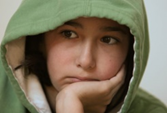Chaplain's Corner

Hi Everyone!
CHANGE – PART 2
CHANGE such as I wrote about last week, can cause mixed emotions: excitement, anticipation, or anxiety etc…. I’d like to focus on the emotion of anxiety. I know that that is an emotion I experience when I face change in my life. But it is when we work through anxiety, both we AND OUR CHILDREN can embrace CHANGE.
I found this article on CHANGE and ANXIETY by Michael Grose, Educational psychologist:
Currently, around 11% of children have problems coping with anxiety (as of 2018). And around 3% experience some form of depression (as of 2018).
Macquarie University psychology lecturer Dr. Carolyn Schniering states that anxiety problems are the most common emotion that children experience.
It’s important to understand that anxiety is not something to be afraid of. As Dr. Schniering says, “It’s a normal emotion and an important part of how we engage with the world.”
It’s not healthy when anxiousness stops kids doing things they want or are able to do or interferes excessively with their school experiences.
Genetics plays a part
Macquarie University research shows that children from a young age who display high levels of anxiety, and who have a parent who is excessively anxious or depressed, are seven to 11 times more likely to develop anxiety. WOW!
SOMETHING WE ALL NEED TO LOOK AT – How do I react to certain situations; was I an anxious child; what coping skills did I develop or do I need to develop??
This finding supports my experience that anxious parents beget anxious kids. But it’s not that simple.
Some children are simply more prone to experiencing excessive anxiousness than others. These kids are typically classified as worriers, shy types and more sensitive souls who wear their hearts on their sleeves. I want to stress that these children are not necessarily going to experience debilitating anxiety, however they do benefit from a parenting style that is empathetic but at the same time empowers them to tackle their fears.
It’s worth noting that if you are overly anxious or experiencing depression, then self-care needs to be your first priority before you can assist your kids.
When should I worry?
Dr. Schniering says, “As a rule of thumb, parents should be more concerned if the fears or worries they experience become excessive and their child is unable to deal with everyday life.”
I would also add that when children become overwhelmed by their fears then it may be time to seek professional help. A first port of call may be a General Practitioner or your child’s school.
Helpful (& unhelpful) parenting practices
Before looking at helpful practices, let’s quickly list some practices that are unhelpful for parenting anxious kids:
• Fixing kids’ problems. Jumping in too soon only increases anxiety and doesn’t enable kids to build their capabilities.
• Allowing avoidance. Letting kids escape new or fearful situations validates their fears.
• A ‘Get over it’ attitude. There’s a difference between “You can do this!” and “For goodness sake, get over it!” The latter often comes from parent impatience and stress.
Okay, now for the helpful parenting practices for kids who are anxious. These include:
1. Skilling towards bravery: Help kids face their fears by skilling them up. (“Look around for a friendly face when you go to scouts.’’) You need to put your coaching hat to build skills and self-confidence, which defeats anxiety.
2. Scaffolding towards bravery: Rather than avoidance, allow kids to face their fears in stages (“Let’s go to the party for an hour, then I’ll pick you up.”) By breaking things down into smaller stages kids feel that they are more in control.
3. Be empathetic, not sympathetic: There is a difference. Empathy shows you understand how they feel; however, sympathy can lead you to pay excessive attention to the fear as well as and letting them off the hook. Kids need a supportive adult who says (but not necessarily in these words), ‘I know how you feel but I also know you can do this.’
4. Creating opportunities for independence: Building children’s self-help skills and their independence outside of the home has a snowball effect on how they feel about situations that they usually fear.
5. Model bravery: But if you want kids to be brave then you go first. Your calmness, patience and willingness to work your way through new situations has a calming effect on kids as well as showing them how fears of unknown, new social situations, and even specific fears such as going to the dentist, can be handled positively.
It’s worth noting that most kids grow out of their anxiety given attentive, brave parenting.
Also I came across a great article from REACH OUT for parents who have a child transitioning to secondary/high school. You will really find this very inciteful so just control/click on this link: Transition to high school for teenagers - ReachOut Parents
Robyn Mulholland, (School Chaplain)
robyn.mulholland@education.vic.gov.au






